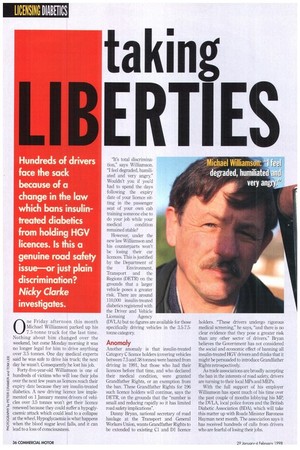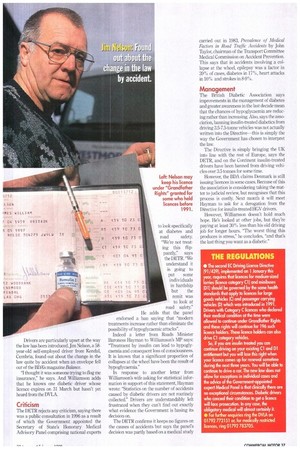LICENSING DIABEFICS Hundreds of drivers face the sack because of
Page 40

Page 41

If you've noticed an error in this article please click here to report it so we can fix it.
a change in the law which bans insulintreated diabetics from holding HGV licences. Is this a genuine road safety issue—or just plain discrimination?
Nicky Clarke investigates.
0 ne Friday afternoon this month Michael Williamson parked up his 7.5-tonne truck for the last time. Nothing about him changed over the weekend, but come Monday morning it was no longer legal for him to drive anything over 15 tonnes. One day medical experts said he was safe to drive his truck; the next day he wasn't. Consequently he lost his job.
Forty-five-year-old Williamson is one of hundreds of victims who will lose their jobs over the next few years as licences reach their expiry date because they are insulin-treated diabetics. A new driving licence law implemented on 1 January means drivers of vehicles over 3.5 tonnes won't get their licence renewed because they could suffer a hypoglycaemic attack which could lead to a collapse at the wheel. Hypoglycaemia is what happens when the blood sugar level falls, and it can lead to a loss of consciousness. "It's total discrimination," says Williamson. "I feel degraded, humiliated and very angry." Wouldn't you if you'd had to spend the days following the expiry date of your licence sitting in the passenger seat of your own cab training someone else to do your job while your medical condition remained stable?
However, under the new law Williamson and his counterparts won't be losing their car licences. This is justified by the Department of the Environment, Transport and the Regions (DETR) on the grounds that a larger vehicle poses a greater risk. There are around 110,000 insulin-treated diabetics registered with the Driver and Vehicle Licensing Agency (DVLA) but no figures are available for those specifically driving vehicles in the 3.5-7.5tonne category
Anomaly
Another anomaly is that insulin-treated Category C licence holders (covering vehicles between 7.5 and 38 tonnes) were banned from driving in 1991, but those who had their licences before that time, and who declared their medical condition, were granted Grandfather Rights, or an exemption from the ban. These Grandfather Rights for 196 such licence holders will continue, says the DETR, on the grounds that the "number is small and reducing rapidly so it has limited road safety implications".
Danny Bryan, national secretary of road haulage at the Transport and General Workers Union, wants Grandfather Rights to be extended to existing Cl and DI licence holders. "These drivers undergo rigorous medical screening," he says, "and there is no clear evidence that they pose a greater risk than any other sector of drivers." Bryan believes the Government has not considered the social and economic effect of banning all insulin-treated HGV drivers and thinks that it might be persuaded to introduce Grandfather Rights retrospectively.
As trade associations are broadly accepting the ban in the interests of road safety, drivers are turning to their local MPs and MEPs.
With the full support of his employer Williamson has spent much of his time over the past couple of months lobbying his MP, the DVLA, local police forces and the British Diabetic Association (BDA), which will take this matter up with Roads Minister Baroness Hayman next month. The association says it has received hundreds of calls from drivers who are fearful of losing their jobs.
Drivers are particularly upset at the way the law has been introduced. Jim Nelson, a 58year-old self-employed driver from Kendal, Cumbria, found out about the change in the law quite by accident when an envelope fell out of the BDAs magazine Balance.
"I thought it was someone trying to flog me insurance," he says. And Williamson adds that he knows one diabetic driver whose licence expires on 31 March but hasn't yet heard from the DVLA.
Criticism
The DETR rejects any criticism, saying there was a public consultation in 1996 as a result of which the Government appointed the Secretary of State's Honorary Medical Advisory Panel comprising national experts understand it is going to put some individuals in hardship but the remit was to look at road safety." He adds that the panel endorsed a ban saying that "modern treatments increase rather than eliminate the possibility of hypoglycaemic attacks".
Indeed a letter from Roads Minister Baroness Hayman to Williamson's MP says: "Treatment by insulin can lead to hypoglycaemia and consequent loss of consciousness. lt is known that a significant proportion of collapses at the wheel have been the result of hypoglycaemia" In response to another letter from Williamson's wife asking for statistical information in support of this statement, Hayman wrote: "Statistics on the number of accidents caused by diabetic drivers are not routinely collected." Drivers are understandably left frustrated when they can't find out exactly what evidence the Government is basing its decision on.
The DETR confirms it keeps no figures on the causes of accidents but says the panel's decision was partly based on a medical study
carried out in 1983, Prevalence of Medical Factors in Road Traffic Accidents by John Taylor, chairman of the Transport Committee Medical Commission on Accident Prevention. This says that in accidents involving a collapse at the wheel, epilepsy was a factor in 39% of cases, diabetes in 17%, heart attacks in 10% and strokes in 8-9%.
Management
The British Diabetic Association says improvements in the management of diabetes and greater awareness in the last decade mean that the chances of hypoglycaemia are reducing rather than increasing. Also, says the association, banning insulin-treated diabetics from driving 3.5-7.5-tonne vehicles was not actually written into the Directive—this is simply the way the Government has chosen to interpret the law.
The Directive is simply bringing the UK into line with the rest of Europe, says the DETR, and on the Continent insulin-treated drivers have been banned from driving vehicles over 3.5 tonnes for some time.
However, the BDA claims Denmark is still issuing licences in some cases. Because of this the association is considering taking the matter to judicial review, but recognises that this process is costly. Next month it will meet Hayman to ask for a derogation from the Directive for insulin-treated fIGV drivers.
However, Williamson doesn't hold much hope. He's looked at other jobs, but they're paying at least 30% less than his old driving job for longer hours. "The worst thing this produces is stress," he concludes, "and that's the last thing you want as a diabetic."
THE REGULATIONS
• The second EC Driving Licence Directive (91/439), implemented on I January this year, requires that licences for medium-sized lorries (licence category Cl) and minibuses (D1) should be governed by the same health standards that apply to licences for large goods vehicles (C) and passenger carrying vehicles ID) which was introduced in 1991. Drivers with Category C licences who declared their medical condition at the time were allowed to continue under Grandfather Rights and these rights will continue for 196 such licence holders. These licence holders can also drive Cl category vehicles.
So, if you are insulin treated you can continue driving on your existing Cl and DI entitlement but you will lose this right when your licence comes up for renewal sometime during the next three years. You will be able to continue to drive a car. The new law does not allow for exceptions in individual cases and the advice of the Government-appointed expert Medical Panel is that clinically there are no exceptional circumstances. Diabetic drivers who conceal their condition to get a licence will face prosecution. In any case, the obligatory medical will almost certainly it.
• For further enquiries ring the DVIA on 01792 772151 or, for medically restricted licences, ring 01792 783705.












































































































